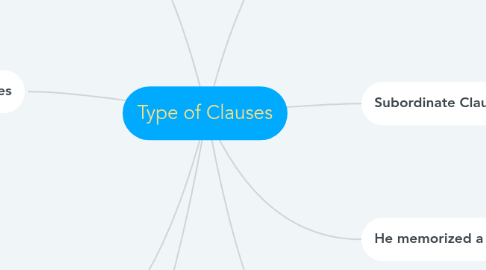Type of Clauses
por Lizeth Mayorga


1. Relative Clauses
1.1. Relative Pronoun or Adverb + Subject + Verb = Incomplete Thought.
1.2. Relative Pronoun as Subject + Verb = Incomplete Thought.
1.3. A relative clause begins with a relative pronoun and functions as an adjective.
2. Noun Clauses
2.1. You really do not want to know the ingredients in Aunt Nancy's stew. Ingredients = noun.
2.2. If we replace the noun ingredients with a clause, we have a noun clause: You really do not want to know what Aunt Nancy adds to her stew. What Aunt Nancy adds to her stew = noun clause.
3. Clauses come in four types: main [or independent], subordinate [or dependent], adjective [or relative], and noun. Every clause has at least a subject and a verb. Other characteristics will help you distinguish one type of clause from another.
4. a clause is a group of related words; but unlike a phrase, a clause has a subject and verb
5. Main Clauses
5.1. Subject + Verb = Complete Thought.
5.1.1. Lazy students whine. Students = subject; whine = verb.
6. Subordinate Clauses
6.1. Subordinate Conjunction + Subject + Verb = Incomplete Thought.
6.1.1. Whenever lazy students whine Whenever = subordinate conjunction; students = subject; whine = verb.
